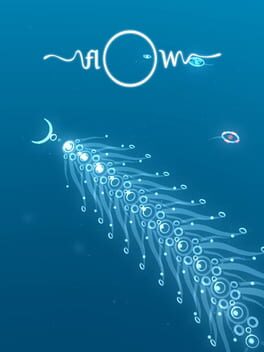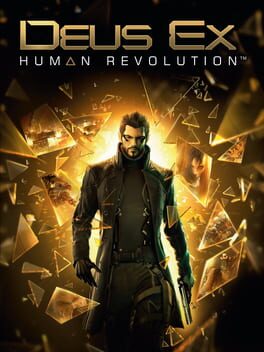Lucca202
BACKER
Recent Activity
Lucca202
backloggd
Children of Morta
11 hrs ago
1 day ago
Lucca202
commented on
Lucca202's
review of
Deadly Premonition

@RedBackLoggd it is, but the tone never quite lets the game go for scares. For instance, whenever the player headshots an enemy (which are generally pretty goofy-looking), York will loudly exclaim "Nice shot!", breaking any tension the moment might have had. If you're interested in Deadly Premonition, it's better to approach it as a comedy/thriller instead.
2 days ago
2 days ago
2 days ago
Lucca202
reviewed
Eloh
ELOH is a puzzle game that has you redirecting tiny projectiles around the screen in an attempt to have them hit a target. Each stage has a different starting layout where there are various types of blocks scattered around that you can reposition in order to achieve that goal. Gameplay is also accompanied by calm BGMs, and every block, when hit, produces a tone, giving something of a musical texture to the experience.
In fact, ELOH is reminiscent of puzzle games like Auditorium, only perfectly deterministic, i.e. much better. There's 84 puzzles to solve, and the challenge level isn't very high, which makes it best as a game to unwind to. I remember buying it way back, in a lazy Saturday morning, and binging it the whole way through.
For three dollars, it's basically a steal.
In fact, ELOH is reminiscent of puzzle games like Auditorium, only perfectly deterministic, i.e. much better. There's 84 puzzles to solve, and the challenge level isn't very high, which makes it best as a game to unwind to. I remember buying it way back, in a lazy Saturday morning, and binging it the whole way through.
For three dollars, it's basically a steal.
3 days ago
Lucca202
reviewed
Flower
If flOw tried to have engaging gameplay but mostly managed to be a game where the fun is in the aesthetics, Flower just embraces that part of the experience from the get-go, and winds up a much better game in the process. Flower puts the player in control of a gust of wind carrying petals whose job is to run through flowery fields, flying over flowers to bloom them. As more flowers bloom, the land becomes more beautiful and more paths open up. That's basically it.
flOw's beautiful visuals and sounds are back with a budget this time around: Flower is a game to play with headphones on to relax, just quietly appreciating not only the idyllic scenery and the beautiful soundtrack, but the sounds from the gentle rustling of the grass and the musical tones produced by each flower. One downside compared to its predecessor, though, is that the motion controls are slightly more annoying this time around, as maneuvering in a 3D space with the Sixaxis makes it super easy to overshoot targets.
There are six levels to play, but aside from the environments and time of day, not much changes between them. Like with flOw, Journey it is not, but if you need something pretty to look at for a few hours, Flower is one of the best possible picks out there.
flOw's beautiful visuals and sounds are back with a budget this time around: Flower is a game to play with headphones on to relax, just quietly appreciating not only the idyllic scenery and the beautiful soundtrack, but the sounds from the gentle rustling of the grass and the musical tones produced by each flower. One downside compared to its predecessor, though, is that the motion controls are slightly more annoying this time around, as maneuvering in a 3D space with the Sixaxis makes it super easy to overshoot targets.
There are six levels to play, but aside from the environments and time of day, not much changes between them. Like with flOw, Journey it is not, but if you need something pretty to look at for a few hours, Flower is one of the best possible picks out there.
4 days ago
Lucca202
reviewed
flOw
In flOw, you play as a microscopic creature swimming in the ocean. Your objective is to move deeper underwater while eating as much food as you can. That food is found both in plankton floating about, as it is in other waterborne beings trying to do the same as you. Some will be much larger, others, much smaller than you, but nevertheless, every one of them is a potential food source that you should work to attain while not becoming their prey yourself.
It is a strikingly simplistic game, and purposefully so: it was born from Jenova Chen's (yes, of Journey fame) master thesis that dealt with Flow theory and Dynamic Difficulty Adjustment, both of those being concepts that are very important to the experience of playing games. To give a brief summary: Flow theory is the idea that, for us humans, when we're performing a task, we can be in multiple states of mind depending on the difficulty of said task: if it's too hard, we become frustrated; too easy and it becomes boredom. However, if the difficulty is just right, we enter a state of satisfaction called the Flow state, which is conducive to keeping doing the same thing.
Games often count on the Flow state to keep us going, and it's easy to see where DDA slots into this idea: if the game can dynamically adjust itself to match its player, making it so they're never stuck but also are never stomping it, it would, in theory, create a more satisfying experience. This has been experimented with since videogames became mainstream consumer products, but would really pick up between the sixth and seventh generation of consoles, where games had become reasonably complex that there were multiple variables that could be tuned invisibly to the player, adjusting the experience.
Famously, Resident Evil 4 (2005) used such a system, and that game was moderately well received. It kind of had its fans, and possibly influenced the industry for years after its release. The system looked at the player's performance in terms of accuracy and damage taken as well as the items they had in stock, assigning a score that then affected the number of enemies in encounters as well as their level of aggressiveness. Dying repeatedly would lower this score, though higher difficulties would prevent the score from going down too far -- Professional would lock it to max at all times, so there was no DDA. It worked so well that Resident Evil 4 (2023) still uses more or less the same ideas, and that's maybe the best game of 2023.
Discussing these concepts is unfortunately far more interesting than discussing flOw itself. flOw is fine: it stood out as an inventive title back when downloading games on a console was new, and its geometric, shimmering visuals accompanied by the calm ambience and echoing tones carried the experience. Even the motion controls, which are a bit shoehorned, become natural after a while since the creatures twist around so gracefully. It bears saying that they do make it hard to maneuver, which feeds into the game's actual problems.
In regards to its theoretical goal of maintaining a Flow state through DDA, flOw falls on either side of the curve most of the time. With no set goal or true failure state, there's little to strive for more than the aesthetics of a large creature, so one's either bored or entertained by something other than the challenge level. Besides, since threats mostly come in the way of aggressive creatures who maneuver much more effectively than yours, it's tough to feel legitimately challenged: most "deaths" will come from being suddenly zerg-rushed without much of a chance to react.
To be fair, there is a bit of variety in the form of different playable creatures: the "snake" can swim faster, the "jellyfish" can spin to lure prey, the "manta" can dash forward, the "electric eel" can paralyze prey to consume them as they're defenseless, the "predator" will lunge at enemy weak points, and finally, the "man-o'-war" can shield itself, then bash enemies to stun them for a bit. Most abilities are not super useful due to the controls, except for paralysis, which is brutally overpowered. Aposematism, yo.
It's a cheap and great looking game, though, and if all you want is to burn a few hours looking at pretty pixels, by all means, go right ahead -- flOw is a great pick. But in the year of 2024, players who hear of the game from publications from its time of release will be confused as to why it garnered such relevance back in the day.
It is a strikingly simplistic game, and purposefully so: it was born from Jenova Chen's (yes, of Journey fame) master thesis that dealt with Flow theory and Dynamic Difficulty Adjustment, both of those being concepts that are very important to the experience of playing games. To give a brief summary: Flow theory is the idea that, for us humans, when we're performing a task, we can be in multiple states of mind depending on the difficulty of said task: if it's too hard, we become frustrated; too easy and it becomes boredom. However, if the difficulty is just right, we enter a state of satisfaction called the Flow state, which is conducive to keeping doing the same thing.
Games often count on the Flow state to keep us going, and it's easy to see where DDA slots into this idea: if the game can dynamically adjust itself to match its player, making it so they're never stuck but also are never stomping it, it would, in theory, create a more satisfying experience. This has been experimented with since videogames became mainstream consumer products, but would really pick up between the sixth and seventh generation of consoles, where games had become reasonably complex that there were multiple variables that could be tuned invisibly to the player, adjusting the experience.
Famously, Resident Evil 4 (2005) used such a system, and that game was moderately well received. It kind of had its fans, and possibly influenced the industry for years after its release. The system looked at the player's performance in terms of accuracy and damage taken as well as the items they had in stock, assigning a score that then affected the number of enemies in encounters as well as their level of aggressiveness. Dying repeatedly would lower this score, though higher difficulties would prevent the score from going down too far -- Professional would lock it to max at all times, so there was no DDA. It worked so well that Resident Evil 4 (2023) still uses more or less the same ideas, and that's maybe the best game of 2023.
Discussing these concepts is unfortunately far more interesting than discussing flOw itself. flOw is fine: it stood out as an inventive title back when downloading games on a console was new, and its geometric, shimmering visuals accompanied by the calm ambience and echoing tones carried the experience. Even the motion controls, which are a bit shoehorned, become natural after a while since the creatures twist around so gracefully. It bears saying that they do make it hard to maneuver, which feeds into the game's actual problems.
In regards to its theoretical goal of maintaining a Flow state through DDA, flOw falls on either side of the curve most of the time. With no set goal or true failure state, there's little to strive for more than the aesthetics of a large creature, so one's either bored or entertained by something other than the challenge level. Besides, since threats mostly come in the way of aggressive creatures who maneuver much more effectively than yours, it's tough to feel legitimately challenged: most "deaths" will come from being suddenly zerg-rushed without much of a chance to react.
To be fair, there is a bit of variety in the form of different playable creatures: the "snake" can swim faster, the "jellyfish" can spin to lure prey, the "manta" can dash forward, the "electric eel" can paralyze prey to consume them as they're defenseless, the "predator" will lunge at enemy weak points, and finally, the "man-o'-war" can shield itself, then bash enemies to stun them for a bit. Most abilities are not super useful due to the controls, except for paralysis, which is brutally overpowered. Aposematism, yo.
It's a cheap and great looking game, though, and if all you want is to burn a few hours looking at pretty pixels, by all means, go right ahead -- flOw is a great pick. But in the year of 2024, players who hear of the game from publications from its time of release will be confused as to why it garnered such relevance back in the day.
4 days ago
4 days ago
4 days ago
5 days ago
5 days ago
5 days ago
5 days ago
Lucca202
reviewed
Deus Ex: Human Revolution
Deus Ex is considered one of the great classics of PC gaming: its original release was way back in the year 2000, and to this day, it still has its fans. It is even said that whenever you bring up the name, someone reinstalls that game. Standing on the shoulder of that giant, Deus Ex: Human Revolution is... not like that. It's a revival that's as close to a reboot as you can get without actually rebooting a series, reusing some of the setting but having a different tone, story and characters, as well as a different approach to game design in general.
And it is a fascinatingly okay game -- as close to the definition of PS360 AAA slop one can get, minutely designed from the ground up to impress a new generation of players while feeling as sterile and anodyne as possible. hbomberguy did a phenomenal dive into the troubled history of the game's development, which you should watch if you have three hours to spare, but the basic gist is that the change of developer to Eidos combined with a set-in-stone development blueprint created a game that's certainly enjoyable, but oddly underdeveloped in certain points and unambitious in others.
In the world of Human Revolution, human augmentation is a reality, with people being able to enhance or even replace their limbs and organs with machines that offer greater functionality. You might think this would be an idyllic world, where our physical bodies and their limitations don't matter as much anymore. If you do, you're probably new to cyberpunk. Hi. Welcome. Hope you enjoy your stay. And remember the keyword: "capitalism". Earth in HR has been ravaged by mega-corporations and is suffering the effects of extreme pollution and global warming, all while its people agonize under crumbling governments and widespread poverty. To make matters worse, augmented people, who don't always have a choice in getting augments, need a regular intake of a medicine called Neuropozyne, an expensive patented drug that forces many into crime, prostitution and indentured servitude to obtain it.
Get it? It's a metaphor. Writers from Eidos knew authors who used subtext and considered them cowards. The game uses augmentation to create parallels for many issues that affect modern society, from racism to healthcare, from abortion to the housing crisis, weaving its dystopian future into quests, logs and even conversations between NPCs on the street. This extensive and blatant criticism of late-stage capitalism made it even more amusing that Mankind Divided was the one accused of veering the Deus Ex series into "social justice warrior" territory. One has to wonder if those people just started blasting from minute one in HR, ignoring every single line of dialogue in the game.
However, as much as I would like to call those people illiterate, which, to be fair, they probably were, the main story in Human Revolution is conducive to such an approach. Even though the worldbuilding is relatable and easy to get lost in, the main narrative does not explore those themes nor claim that much depth. You play as Adam "I Never Asked For This" Jensen, the head of security for Sarif Industries, that being a company that specializes in augmentation technology. Shortly before revealing to the world a breakthrough that would have revolutionized augmentation science, Sarif's HQ is attacked and most of their head scientists are killed, their research being destroyed in the process. A near-dead Adam is pulled from the rubble and is submitted to extensive augmentation surgery to restore his body's functions. Six months later, he returns to Sarif and begins investigating the attack.
It's not that the main story is bad -- far from it, it's exciting and high stakes -- but instead of focusing on the sociological aspects that shape the world or that led to the great conspiracy that resulted in the attack on Sarif, it chooses instead to focus on the personal stakes certain characters have in it, and the further one goes into the game, the less interested it becomes in developing its world. Many fascinating facts and events go completely unexplained, the plot zooming past them without as much as an in-game file to read on. The final segment is obscene in this regard, presenting an unbelievable contraption that had been teasingly namedropped throughout the whole game, then never discussing what it is or does, just having the player shoot at it.
Again, it's not that it's bad, but it feels directionless and unimaginative. In that sense, gameplay fares somewhat better, but not by much. Deus Ex: HR throws nostalgia out the window, taking inspiration not from immersive sims, but from modern AAA first-person games. At its core, Human Revolution is an FPS, and a competent one at that, but an immediately noticeable difference is that, while it is possible to blast your way through enemies, Adam dies just about as fast as they do, and so the levels are designed in ways that make stealth almost always the better option, there always being at least one path that avoids confrontations entirely.
This is something Human Revolution doesn't get enough credit for: stealth is fluid and effective, and it's also a bit of a puzzle in itself. In so many games that try to give players options, levels are designed in ways that stop short of having signs that say "this way to Sneakville, that way to Combatland" above each obviously designated path. In contrast, areas in HR are more open and coherent, requiring that the player study each environment and plan their movements adequately. It's still not immersive-sim levels of freedom, and you're still basically being led from one room to another, but it does a fairly good job.
What isn't as great is... basically every other system that isn't "sneak" or "gun". There's a skill tree that allows Adam to improve or add to his augmentations -- already getting completely disconnected from the worldbuilding -- that is in theory supposed to reinforce the openness of the game, allowing the player to develop Adam in ways that better suit their playstyle. In practice, the sheer importance of certain skills and the constant need for exp steamroll over the roleplaying and drive any sort of decision-making. In fact, a lot of the game is spent in Adam's Breaking-And-Entering Simulator 2027, where he just ignores his mission to break into every apartment, open every vault and read every email simply because it gets him to level up faster.
This is to say a lot of points will be put towards lockpicking/hacking and social minigames, which are all basically memes at this point. These are the bits of the experience that feel the most unambitious. Each side game is functional and even fun at times, but also feel disconnected from the rest of the experience and could very well have been excluded from the game at no significant loss. The social battles are the most irksome, as the need to record multiple different lines and paths a single conversation could take seems to signal high effort, yet the system itself is simplistic and uninteresting.
Social battles are still not the worst offender in terms of gameplay. No, that honor goes to the one type of section that has been talked about to death, which is, of course, the boss battles. There's some neat ideas surrounding... one of them... but it's incredibly odd that these made it past any design stage, as they're such a brilliantly stupid idea. A forced boss encounter is a quick way to piss off every type of player: stealthy players will have zero lethal weapons on them, meaning the boss must be beatable using only things found in the arena. This, in turn, is a middle finger to shooty players, who will feel like their preparation was completely unnecessary and they could have just McGiver'ed something on the spot and forgotten about their guns. It's a highly polished mess.
And what better way is there to summarize the experience? There is stuff to nitpick about in Human Revolution for days, but in all of them, the level of craftsmanship shines through. It's a disappointment, not in the sense that it's bad, but in the sense that it's fine, and could have been so much more. Again, I recommend the hbomberguy essay for the full context.
And it is a fascinatingly okay game -- as close to the definition of PS360 AAA slop one can get, minutely designed from the ground up to impress a new generation of players while feeling as sterile and anodyne as possible. hbomberguy did a phenomenal dive into the troubled history of the game's development, which you should watch if you have three hours to spare, but the basic gist is that the change of developer to Eidos combined with a set-in-stone development blueprint created a game that's certainly enjoyable, but oddly underdeveloped in certain points and unambitious in others.
In the world of Human Revolution, human augmentation is a reality, with people being able to enhance or even replace their limbs and organs with machines that offer greater functionality. You might think this would be an idyllic world, where our physical bodies and their limitations don't matter as much anymore. If you do, you're probably new to cyberpunk. Hi. Welcome. Hope you enjoy your stay. And remember the keyword: "capitalism". Earth in HR has been ravaged by mega-corporations and is suffering the effects of extreme pollution and global warming, all while its people agonize under crumbling governments and widespread poverty. To make matters worse, augmented people, who don't always have a choice in getting augments, need a regular intake of a medicine called Neuropozyne, an expensive patented drug that forces many into crime, prostitution and indentured servitude to obtain it.
Get it? It's a metaphor. Writers from Eidos knew authors who used subtext and considered them cowards. The game uses augmentation to create parallels for many issues that affect modern society, from racism to healthcare, from abortion to the housing crisis, weaving its dystopian future into quests, logs and even conversations between NPCs on the street. This extensive and blatant criticism of late-stage capitalism made it even more amusing that Mankind Divided was the one accused of veering the Deus Ex series into "social justice warrior" territory. One has to wonder if those people just started blasting from minute one in HR, ignoring every single line of dialogue in the game.
However, as much as I would like to call those people illiterate, which, to be fair, they probably were, the main story in Human Revolution is conducive to such an approach. Even though the worldbuilding is relatable and easy to get lost in, the main narrative does not explore those themes nor claim that much depth. You play as Adam "I Never Asked For This" Jensen, the head of security for Sarif Industries, that being a company that specializes in augmentation technology. Shortly before revealing to the world a breakthrough that would have revolutionized augmentation science, Sarif's HQ is attacked and most of their head scientists are killed, their research being destroyed in the process. A near-dead Adam is pulled from the rubble and is submitted to extensive augmentation surgery to restore his body's functions. Six months later, he returns to Sarif and begins investigating the attack.
It's not that the main story is bad -- far from it, it's exciting and high stakes -- but instead of focusing on the sociological aspects that shape the world or that led to the great conspiracy that resulted in the attack on Sarif, it chooses instead to focus on the personal stakes certain characters have in it, and the further one goes into the game, the less interested it becomes in developing its world. Many fascinating facts and events go completely unexplained, the plot zooming past them without as much as an in-game file to read on. The final segment is obscene in this regard, presenting an unbelievable contraption that had been teasingly namedropped throughout the whole game, then never discussing what it is or does, just having the player shoot at it.
Again, it's not that it's bad, but it feels directionless and unimaginative. In that sense, gameplay fares somewhat better, but not by much. Deus Ex: HR throws nostalgia out the window, taking inspiration not from immersive sims, but from modern AAA first-person games. At its core, Human Revolution is an FPS, and a competent one at that, but an immediately noticeable difference is that, while it is possible to blast your way through enemies, Adam dies just about as fast as they do, and so the levels are designed in ways that make stealth almost always the better option, there always being at least one path that avoids confrontations entirely.
This is something Human Revolution doesn't get enough credit for: stealth is fluid and effective, and it's also a bit of a puzzle in itself. In so many games that try to give players options, levels are designed in ways that stop short of having signs that say "this way to Sneakville, that way to Combatland" above each obviously designated path. In contrast, areas in HR are more open and coherent, requiring that the player study each environment and plan their movements adequately. It's still not immersive-sim levels of freedom, and you're still basically being led from one room to another, but it does a fairly good job.
What isn't as great is... basically every other system that isn't "sneak" or "gun". There's a skill tree that allows Adam to improve or add to his augmentations -- already getting completely disconnected from the worldbuilding -- that is in theory supposed to reinforce the openness of the game, allowing the player to develop Adam in ways that better suit their playstyle. In practice, the sheer importance of certain skills and the constant need for exp steamroll over the roleplaying and drive any sort of decision-making. In fact, a lot of the game is spent in Adam's Breaking-And-Entering Simulator 2027, where he just ignores his mission to break into every apartment, open every vault and read every email simply because it gets him to level up faster.
This is to say a lot of points will be put towards lockpicking/hacking and social minigames, which are all basically memes at this point. These are the bits of the experience that feel the most unambitious. Each side game is functional and even fun at times, but also feel disconnected from the rest of the experience and could very well have been excluded from the game at no significant loss. The social battles are the most irksome, as the need to record multiple different lines and paths a single conversation could take seems to signal high effort, yet the system itself is simplistic and uninteresting.
Social battles are still not the worst offender in terms of gameplay. No, that honor goes to the one type of section that has been talked about to death, which is, of course, the boss battles. There's some neat ideas surrounding... one of them... but it's incredibly odd that these made it past any design stage, as they're such a brilliantly stupid idea. A forced boss encounter is a quick way to piss off every type of player: stealthy players will have zero lethal weapons on them, meaning the boss must be beatable using only things found in the arena. This, in turn, is a middle finger to shooty players, who will feel like their preparation was completely unnecessary and they could have just McGiver'ed something on the spot and forgotten about their guns. It's a highly polished mess.
And what better way is there to summarize the experience? There is stuff to nitpick about in Human Revolution for days, but in all of them, the level of craftsmanship shines through. It's a disappointment, not in the sense that it's bad, but in the sense that it's fine, and could have been so much more. Again, I recommend the hbomberguy essay for the full context.
5 days ago



